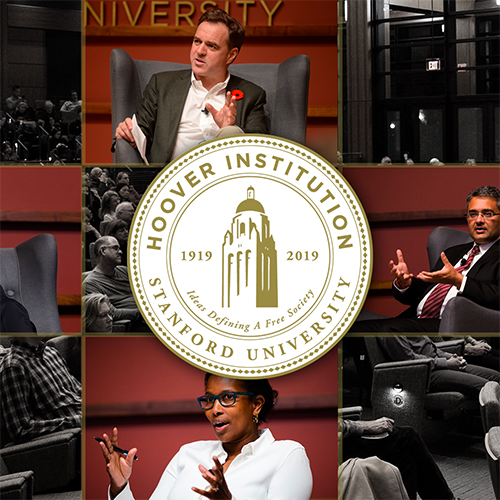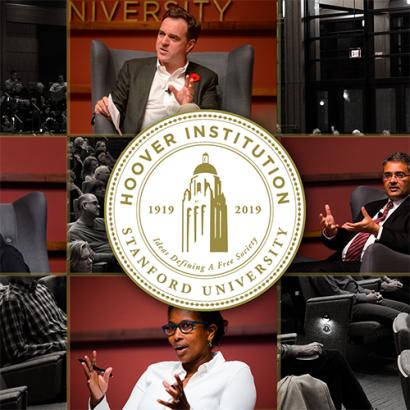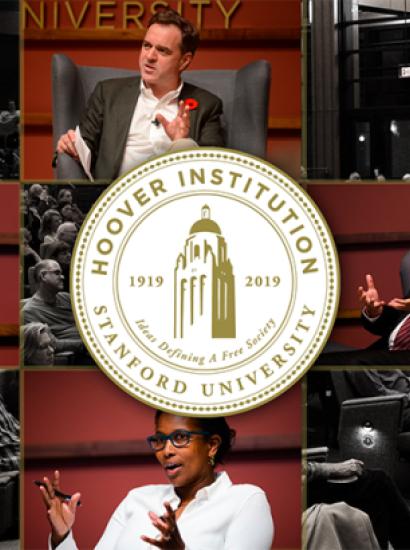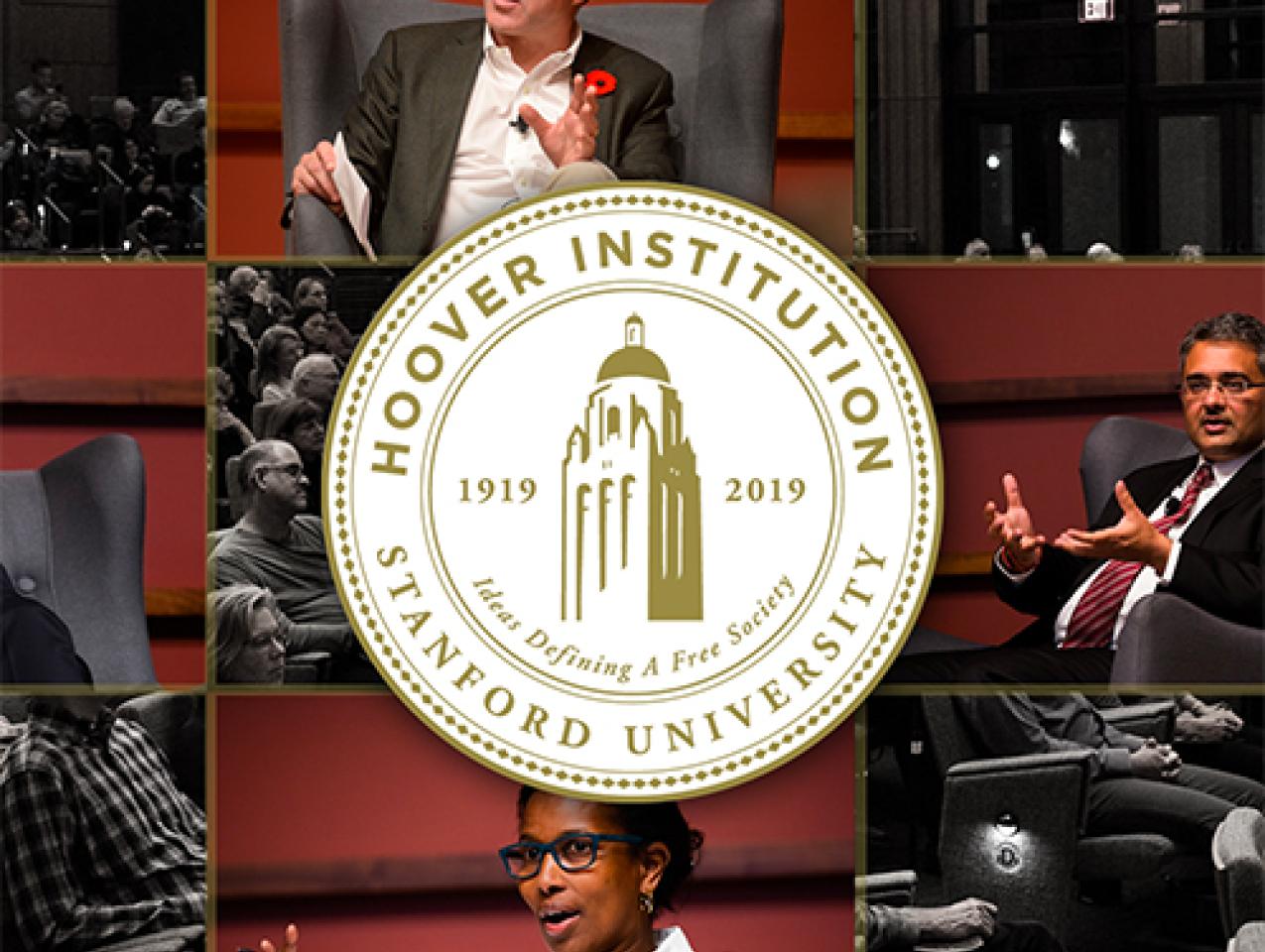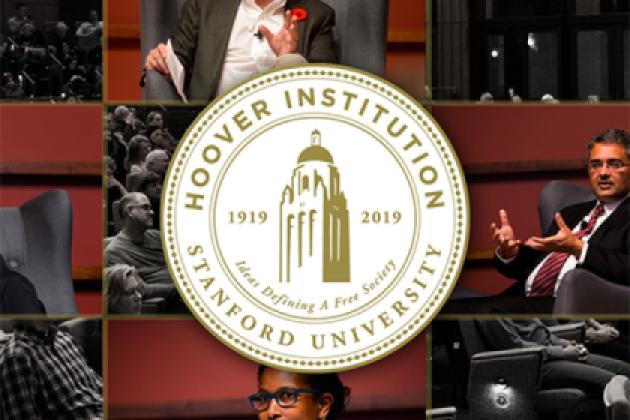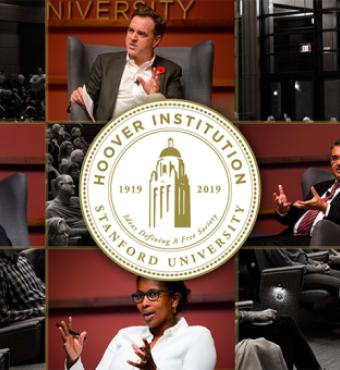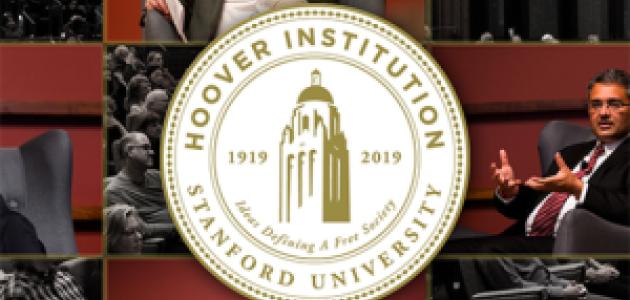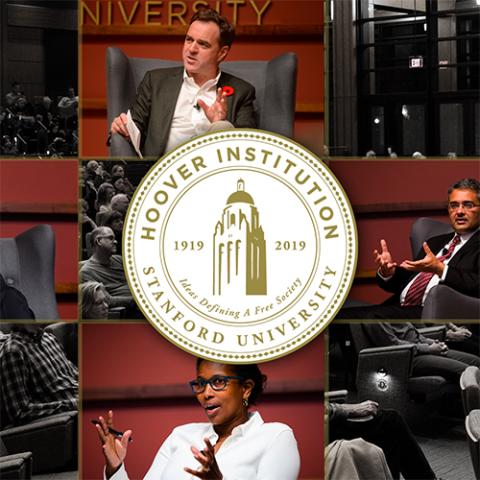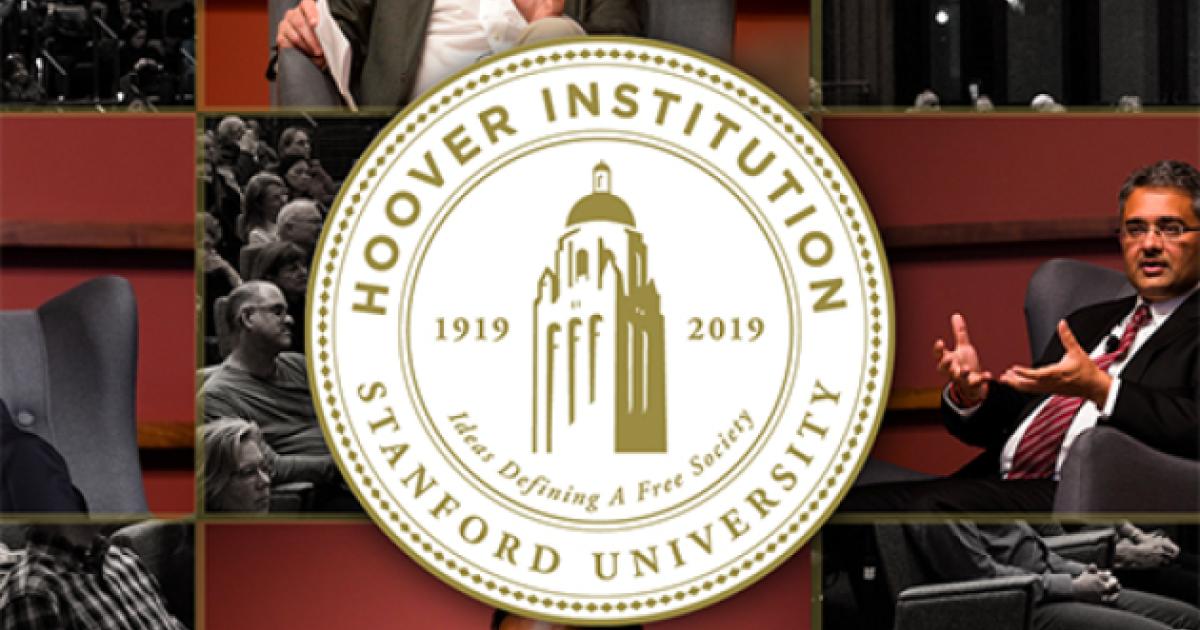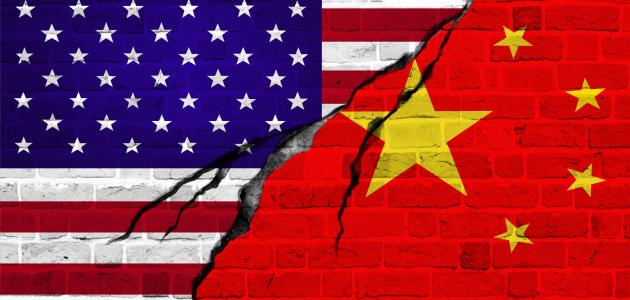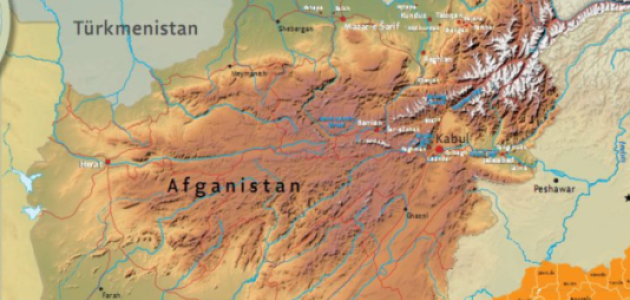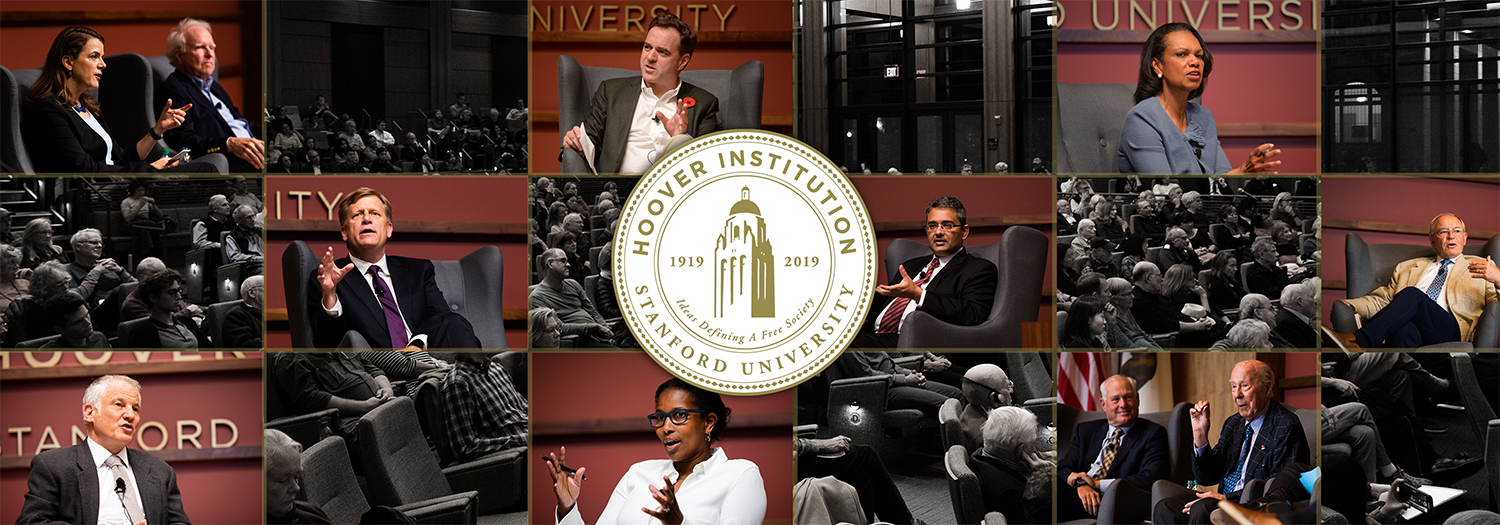
Hoover Institution (Stanford, CA) – The Hoover Institution marked one hundred years of its history by expounding its commitment to the ideas of individual, economic, and political freedom; private enterprise; and limited and effective government.
Events included a Centennial Speaker Series, dynamic lectures at the Fall 2019 retreat, and the opening of a special exhibition in Hoover Tower, exploring the story behind the Institution’s formation and showcasing highlights from the vast collection of rare materials collected by the library and archives—centered around the ideas of peace, freedom, and education.
Speaker Series: A Century of Ideas for a Free Society
Throughout 2019, the Hoover Institution hosted “A Century of Ideas for a Free Society,” a speaker series featuring Hoover scholars examining central lessons of history in the twentieth and twenty-first centuries. The series commemorated Hoover scholars’ influence on the policy-making process and provided a clear perspective on the future of America. The events were as follows:
March 26, 2019: Condoleezza Rice, Niall Ferguson, and Stephen Krasner spoke about one hundred years of democracy and foreign policy. The three speakers examined the current international landscape and debated whether democratic norms were receding in favor of populism, authoritarianism, and totalitarianism. Topics included the economic crises in European democracies, the backlash against globalism, the general loss of faith in the West’s democratic institutions, and China’s repression of individual freedom and its policies that threaten democracy throughout the world. All three panelists were unanimous that American leadership is needed to stand strong against antidemocratic forces.
April 18, 2019: Peter Robinson, Terry Anderson, John Cogan, Lee Ohanian, and George Shultz talked about the foundations that have sustained America’s rise in living standards over the past century. Cogan argued that the sufficient conditions behind America’s history of prosperity are policies that encourage individuals to pursue vocations that fit their talents, provide them with opportunities to reap significant fruits from their labor, and offer the right incentives for businesses and workers to provide goods and services that benefit themselves and society. The panelists concurred that the rule of law, private property, and free and open markets are the necessary conditions that undergird sustained prosperity. Ohanian added that prosperity depends on an immigration system that allows for a constant inflow of intelligent and entrepreneurial people who are willing to take risks to invent cutting-edge technologies and open new businesses. Shultz maintained that government has a necessary role in helping stabilize the monetary system and in providing societal safety nets, including unemployment compensation and social security.
May 20, 2019: Jonathan Levin, Edward Lazear, Amit Seru, and Stephen Haber discussed the rapidly changing technological sphere and its impact on the future of the American economy. The panelists explained America’s history of technological innovation over the past century and how it has led to unprecedented rates of economic growth and individual prosperity. Topics included the rise of artificial intelligence and its effects on labor and wages, and how the growth of big firms like Amazon and Google shape the competitive landscape for smaller firms and start-ups. Also discussed were potential threats to continued prosperity, including the temptation to impose government regulation, which can stall engines of economic growth.
June 4, 2019: Niall Ferguson, Ayaan Hirsi Ali, Larry Diamond, and H. R. McMaster discussed cyber warfare and countering ideological threats to free and open societies. Topics included the rise of cyber jihadism and the emergence of powerful disinformation campaigns against the United States and Western democracies by authoritarian regimes Russia and China. The speakers concurred that Americans need to be properly educated about such threats, must work to solve issues of disunity that are being exploited by adversaries, and should be willing to wage information campaigns to defend attacks against America’s universal principles of classical liberalism.
July 18, 2019: Peter Robinson, Andrew Roberts, Stephen Kotkin, and David Kennedy surveyed the three great leaders of the Second World War: Franklin Delano Roosevelt, Winston Churchill, and Joseph Stalin. The historians discussed the individual attributes of each leader, their strategies and aims in their alliance against the Axis powers, and how their respective legacies shaped the future of the international order following the war.
August 20, 2019: Robert Pondiscio, Macke Raymond, Eric Hanushek, and Terry Moe underlined the need to reform the US education system to improve the quality of the American labor force—the key determinant of a nation’s economic growth and prosperity. Among the topics discussed were the Every Student Succeeds Act (ESSA), the primary federal legislation that governs national education policy, and how it relates to teacher accountability; the marketplace of school choice; and the viability of charter schools and other alternative school systems. A significant debate among the panel was whether school choice alone leads to the improvement of education quality or whether an additional backstop of regulation is needed to enforce standards.
September 24, 2019: Admiral Cecil Haney (US Navy, Ret.), Michael McFaul, Abbas Milani, and Gary Roughead examined the current regional power dynamics and how rapidly changing technology influences conflict, both present and future. Areas discussed included Russia’s weapons systems and ambitions to disable and disassemble NATO; China’s growth as a naval power and how it threatens its neighbors; and Iran’s internal political situation and its renewed efforts for a nuclear program. In addition, the national security experts covered how China, Russia, and Iran are cooperating with one another through combinations of mutual defense agreements and infrastructure investments. They argued that American security against emerging threats depends on an educated populace, cooperation between private and public sectors, and a fundamental understanding of America’s national interests.
October 2, 2019: Darrell Duffie, Jennifer Burns, Robert Hall, and John Taylor spoke about tax and monetary reform, and the institutional frameworks and rules that that have fostered American financial prosperity. Burns began the discussion by examining the nation’s economic history since the “Roaring ’20s” through the prism of the life and ideas of the late economist and Hoover scholar Milton Friedman. Burns said Friedman advocated empowering individual choice as the best way to ensure consistency and stability in an economy. Freidman believed that this was best achieved in practice through the implementation of immutable “rules” that individuals and businesses could use as guideposts, rather than through the volatile discretion of authorities. As an example, Hall discussed the flat tax, a concept he originated with Hoover Institution senior fellow emeritus Alvin Rabushka. Hall argued that though the flat tax hasn’t been adopted on a universal basis, it has influenced the national discussion about taxation of consumption rather than earnings—leading policy makers to incentivize tax-deferred retirement programs like 401ks and Individual Retirement Accounts (IRAs). Taylor invoked his own principle, the “Taylor rule” as a guidepost for monetary policy. He argued that a central bank should set interest rates so as to ensure economic stability and keep inflation low. All three panelists concurred that the overarching role of the government is to establish and enforce simple rules to enable the free market to maximize prosperity.
November 4, 2019: Niall Ferguson and Victor Davis Hanson discussed the mission and history of the Hoover Institution, and the nature of conflict in the twentieth century. Hanson said that President Hoover founded the Institution based upon the fundamental belief that the nature of peace was rooted in a constitutional order of individual liberty. Hanson and Ferguson lauded the personal courage and contributions of Milton Friedman, Robert Conquest, and Thomas Sowell as key Hoover intellectuals whose ideas affected national conversations on politics and policy in the postwar era. Hanson and Ferguson then came to focus on the Second World War, specifically Allied response to the German threat, and a counterfactual narrative that considers how the Axis powers might have won the war.
November 19, 2019: John Raisian, John Cochrane, Caroline Hoxby, and George Shultz discussed how to best empower labor and financial capital in American society. Hoxby began the conversation by explaining the importance of empowering individuals to make choices in how they acquire fundamental skills for human flourishing and productivity in the economy. John Cochrane argued that the foundation for financial prosperity is the freedom to buy, sell, invest, and transfer assets domestically and internationally. Providing a sweeping lesson on American economic history over the past century, he explained that the antecedents that secure that freedom are the rule of law, a stable currency, and freedom from excessive taxation. Shultz provided anecdotes about his tenure as US secretary of labor that illustrated important lessons of strategic thinking and morality in labor relations.
The Centennial Speaker Series will conclude on January 14, 2020, in a conversation with James Mattis, Kiron Skinner, Josiah Oner, and Michael McConnell, about the history of immigration in the United States, the concept of citizenship, and citizenship’s most important component—voting rights.
All Centennial Speakers Series panels can be viewed at Hoover.org.
Centennial Celebration at 2019 Fall Retreat
In November, the Hoover Institution hosted its Fall Retreat 2019 in celebration of it centennial, shining a spotlight on the ideals of a free society.
The keynote program featured Jimmy Lai, Chinese entrepreneur, publisher, and longtime advocate of human rights. In conversation with Peter Robinson as part of the Uncommon Knowledge series, Lai spoke about his commitment to individual freedom, his persecution as an activist in Hong Kong, and the region’s current political crisis.
Asked by Robinson if he plans to flee Hong Kong despite threats against him and his family, Lai responded: “I would not get out of Hong Kong. … I have long determined not to be frightened by fear. I tell myself, don’t think about the consequences. Just do what’s right.”
The retreat also featured lectures and panel discussions by Ayaan Hirsi Ali on the importance of standing up for liberty in America; Lee Ohanian, Scott Atlas, Niall Ferguson, and John Cochrane on the problems of socialism; Peter Berkowitz on the philosophy of John Locke as compared with that of Karl Marx; Kevin Hassett on the free-market reforms initiated by the White House; and Shelby Steele and civil rights leader Robert Woodson Sr. on applying free-market principles to alleviate poverty.
Centennial Exhibition in Hoover Tower
On October 10, 2019, the Hoover Institution Library & Archives opened its new exhibition Hoover@100: Ideas Defining A Century.
Located in the historic Hoover Tower, the exhibition tells the story of Herbert Hoover’s inspiration to build the world’s premier library dedicated to the study of war, revolution, peace, and human freedom.
Through the presentation of rare original documents and artifacts from the Institution’s vast collection and the works of its scholars, the special exhibition illustrates President Hoover’s motivations, values, and relationship with Stanford University, and how over the course of a century the Hoover Institution became one of America’s leading public-policy research centers.
The exhibition will run through July 31, 2020.







